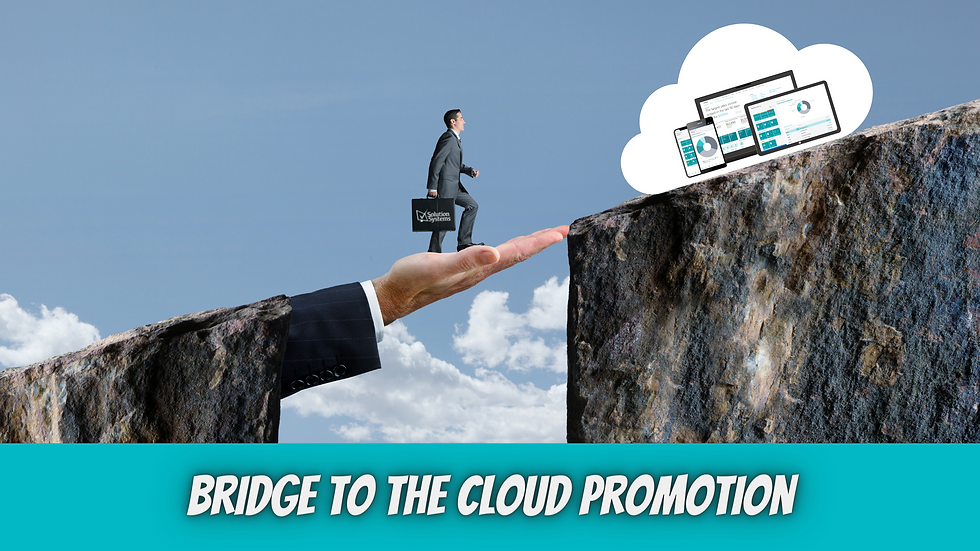What are the differences between Business Central in the Cloud and On-premise?
- Michael Intravartolo

- Oct 25, 2022
- 4 min read

The decision is made and your organization chose Microsoft Dynamics 365 Business Central as your next ERP software. Regardless of whether or not this is a new implementation or an upgrade from Dynamics NAV, you must choose whether or not to move forward with Business Central in the cloud or Business Central on-premise. For some this is an easy decision because of past experiences and personal preferences. For others the decision is not an easy one and questions should be asked. Questions like, what are the differences? Are there differences? What hardware do I need? In this post we'll define what the main differences are between Business Central cloud and on premise software.
What is Cloud ERP Software?
Cloud enterprise resource planning software (ERP) refers to any software that is accessible by using the internet. Cloud ERP software aims to deliver employee flexibility and less up-front organizational costs.
What is On-premise ERP Software?
On-premise enterprise resource planning software refers to software that is installed on and controlled through organizational controlled servers. On-premise ERP software aims to deliver full control, including security, to the organization.
At first, you might wonder why ERP cloud software is all the rage lately because you don't have full control like you do with on-premise ERP. But it makes sense once you understand how much less effort is required.
Business Central Cloud vs On-premise differences
Let's start by taking a look at the below comparison charts that outline some of the basic differences between hosting options and the differences between Business Central cloud and Business Central on-premise. Right away for me, some things really stand out as differences. Updates, custom development license, and Office 365 integrations all have stark money saving differences.
1. Business Central Updates
Business Central cloud updates are automatically applied each month. You'll always be on the latest version of the software and have eliminated the need for paid on-premise upgrades. Business Central on-premise updates are paid because they will have to be applied through your Microsoft partner.
2. Business Central Development License
Business Central cloud custom development license is not needed. You can apply as many customizations through extensions and apps as you'd like. Business Central on-premise requires tables, code units, pages, etc. to customize your software and these "objects" require purchase.
3. Business Central Office 365 Integrations
Business Central cloud Office 365 integrations require minimal effort to connect and work seamlessly throughout the software. Business Central on-premise Office 365 integrations requires configuration of Azure Active Directory and still has some integration limitations.


4. Storage Capacity
Both Business Central cloud and Business Central on-premise have unlimited storage capabilities. You can choose to pay for upgrades to your on-site hardware to increase your on-premise storage or you can choose to pay Microsoft to increase your cloud storage. The main difference between the two is with Business Central cloud the increased storage cost will be a recurring monthly cost and the on-premise storage increase will be a one-time purchase.
5. Performance
Business Central performance questions are not a new thing. Way back yonder before Dynamics NAV was rebranded to Business Central organizations from time to time battled with on-premise performance issues. Today's Business Central on-premise software is no different. It's very robust and requires optimal hardware to run efficiently. Most organizations today understand this. What seems to be a more frequent question is the performance of Business Central cloud software especially for larger businesses. In my opinion, there is not a need to worry about cloud performance issues. Microsoft is a large organization that spends a lot of money on their resources to keep their runtime at 99.99%. Have a look at this article where I go over in detail Microsoft's cloud performance: Can a big business use Business Central ERP?
6. Security
Since you've begun reading this article there have been numerous hacker attacks. Security has to be top of mind when choosing an ERP software. Most people believe on-premise software is more secure because you have more control. Is that true? Listen to the short podcast segment below where Information Technology Specialist Keith Stefanski breaks down the differences between cloud and on-premise security and which he believes to be more secure.
7. Implementation Speed
Implementations cost money, therefore a quicker implementation means more money in your pocket. However, quicker implementations usually meant more issues because corners were cut to meet deadlines. Is Business Central on-premise quicker to implement than Business Central cloud? Maybe Business Central cloud is quicker to implement than Business Central on-premise? Can the quicker implementation be done without sacrificing any steps? Listen to this short segment from our podcast A Shot of Business Central and A Beer where we discuss these topics with Business Central Implementation Specialist Mark Heick.
Additional Resources
Business Central Cloud vs On-premise Similarities and Differences Explained.
Role Play: Client Wanting to Upgrade to Business Central
Hopefully, all of the above information will help to aid your decision of whether or not to choose Business Central cloud or Business Central on-premise. ERP intersects with all facets of a business, so it's important to understand these differences and how each can be used to further your business.






